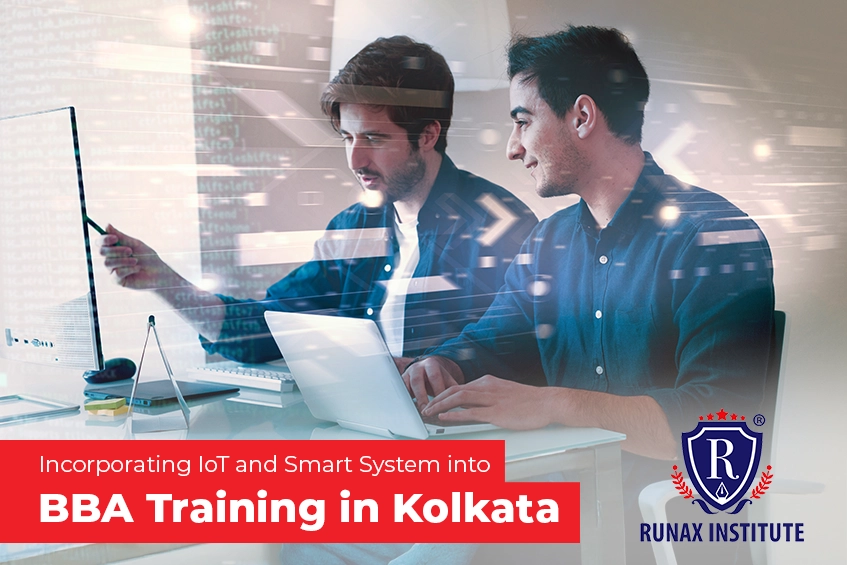Introduction
The hospitality industry has officially gone digital. You walk into a hotel room, and the lights greet you. The AC already knows you like 22 degrees. Housekeeping gets pinged without a word. All of this magic? That’s Hospitality Operations 4.0 in action. It’s a mix of IoT, smart hotel systems, automation, and real-time analytics. And in Kolkata, BBA programs are gearing up to prepare students for this exact revolution.
With smart rooms, AI-powered concierge tools, and sensor-based hospitality management becoming the norm, traditional hospitality training is no longer enough. Students enrolling in a BBA course in Kolkata are now getting hands-on exposure to how tech powers service. This article walks you through how BBA colleges in Kolkata are adapting their curriculum, building labs, and preparing students for a tech-driven future in hospitality.
The Evolution of Hospitality Operations 4.0 in Kolkata’s BBA Colleges
The hospitality sector is embracing its digital renaissance, and BBA colleges in Kolkata are not sitting on the sidelines. They are actively reshaping their programs to reflect the realities of Hospitality Operations 4.0. This evolution isn’t just a course update—it’s a curriculum overhaul. Students are being prepared for a world where hotels run on code as much as customer service.
These institutions are embedding cutting-edge topics such as IoT in the BBA curriculum in Kolkata, real-time analytics, and automation across every operational touchpoint. They’re focusing on smart systems like hotel asset tracking IoT, and smart energy management in hospitality, making tech fluency a must-have for every future hotelier.
No longer is hospitality just about check-ins and courteous smiles. It’s about configuring smart thermostats, integrating guest experience digital tools, and designing dashboards that predict guest needs before they even ask. BBA Hospitality in Kolkata is redefining what it means to be “industry-ready”—fusing business acumen with smart infrastructure literacy in a way that prepares students to lead the future of hotel operations.
Learning IoT Fundamentals Through Hospitality Scenarios
To master smart hospitality, students must first decode the building blocks of IoT. In BBA smart hospitality courses, learners are introduced to foundational concepts such as sensor calibration, network communication protocols, and embedded system basics. They explore how smart devices interact in real-time, enabling sensor-based hospitality management and hotel automation BBA programs in Kolkata to be more than just theory.
Using hospitality-themed scenarios, students simulate smart housekeeping systems using RFID linen tracking, deploy occupancy sensors to manage smart room operations in Kolkata, and configure temperature sensors for guest comfort. These exercises connect textbook knowledge with on-ground relevance, helping them understand how digital transformation in hospitality evolves from the backend tech.
Through lab activities and scenario-based workshops, students also grasp IoT security in hotels, learning about encryption, data transfer protocols, and firewall configuration. This hands-on approach helps them see how tech not only enhances service but also protects privacy in high-stakes hospitality environments.
Hands-On Training with Smart Systems
Smart hospitality can’t be learned just from books. That’s why BBA colleges in Kolkata are investing in real-world, tech-enabled learning environments that mirror actual hotel settings. In dedicated labs, students work on smart infrastructure modules, designing and simulating guest rooms equipped with motion-activated lighting, voice-controlled temperature systems, and keyless app-based door access. They learn to integrate and operate guest experience digital tools such as mobile room service ordering, automated housekeeping requests, and in-room entertainment setups linked via IoT.
Colleges collaborate with IoT vendors and local engineering departments to bring in hardware like Raspberry Pi kits, smart thermostats, RFID tags, and cloud-based monitoring dashboards. These tools allow students to not only build systems but also understand their backend frameworks. Training also covers debugging and system recovery—skills that are vital in a field where digital uptime is critical.
This kind of tech-enabled hospitality training ensures students develop the technical muscle needed to manage modern hotel operations with agility and efficiency.
Real-World Hospitality Analytics with Data Dashboards
Understanding guest behaviour isn’t just a guessing game anymore. In today’s hospitality world, data does the talking—and BBA students are learning to listen. Through dedicated analytics modules, they dive into hospitality data dashboard training that reflects actual hotel operations.
In simulated hotel settings, students monitor metrics like energy usage, staff response times, occupancy patterns, and service frequency. They use visual tools to turn these raw inputs into actionable insights. This includes building and customising dashboards that track live sensor data, such as foot traffic, HVAC system loads, or room service demand spikes.
This training goes beyond numbers. Students learn to ask the right questions: Why is guest satisfaction dropping in Room Block B? Is there a pattern in delayed check-outs? They apply hospitality analytics in BBA to solve operational challenges, enhance efficiency, and ultimately boost the guest experience. These data-centric skills prepare them to lead in a world where every swipe, tap, and sensor ping tells a story.
Addressing Security and Ethics in Smart Hospitality
IoT comes with responsibility. As hospitality operations become smarter, the ethical and secure handling of guest data becomes even more important. BBA programs in Kolkata are integrating dedicated modules that focus on IoT security in hotels, highlighting topics such as data encryption, user authentication, secure APIs, and cloud-based firewall architecture. Students learn not only how smart systems operate but also how to safeguard them.
Training includes real-world case analyses of privacy breaches and cybersecurity lapses in smart hotels. This helps students understand both the technical loopholes and the reputational damage such breaches can cause. Emphasis is also placed on teaching the ethical use of guest data, where students debate data privacy scenarios and apply principles from global regulations like GDPR.
Furthermore, courses emphasise balance. These courses explore the balance between personalisation and intrusion. Smart does not mean invasive. Through simulated exercises, students design smart systems with opt-in permissions, anonymised data logging, and guest-controlled privacy settings. The idea is to build tech-savvy hoteliers who respect digital boundaries while maximising operational efficiency.
This thoughtful approach prepares students to take on leadership roles where digital ethics are as critical as technical competence. Is this useful or creepy? What do you think?
Certifications and Industry Partnerships
In today’s evolving hospitality sector, having academic knowledge isn’t enough—employers want proof of tech-savvy expertise. That’s why BBA colleges in Kolkata are actively partnering with leading hospitality technology companies and IoT vendors to offer industry-relevant certifications. These include credentials in smart hotel systems training, cloud-based property management systems, and hospitality data dashboard training, all bundled into the BBA curriculum.
Employers love certified skills. Colleges now collaborate with tech firms to offer tech-related certifications. Students can earn recognised hospitality tech certifications in PMS software training, IoT-enabled operations management, and ERP for hotel chains. These certificates are not just resume boosters—they’re deal-makers in the job market.
Industry partnerships also bring in guest faculty from smart infrastructure projects and IoT startups, who conduct workshops on sensor-based hospitality management, data privacy regulations, and tech-driven guest experience optimisation. Students get to see how theory translates into real-life hotel tech deployments, from smart lobbies to automated inventory tracking. This regular industry interaction ensures students learn about building the future of hospitality in real-time.
Additionally, institutes are setting up hospitality innovation labs in collaboration with vendors to let students experiment with smart devices, from IoT light grids to voice-controlled concierge services. These alliances make students truly industry-ready, blending academic learning with in-demand practical know-how.
New-Age Career Roles for Tech-Enabled Hospitality Grads
The hospitality job market is shifting gears, and graduates with a tech-enabled BBA background are landing roles beyond traditional hotel management. They’re stepping into titles like IoT Systems Coordinators, Smart Operations Managers, and Digital Concierge Experience Analysts—roles that demand an understanding of both guest service and intelligent infrastructure. Employers aren’t just looking for people who can supervise a front desk—they want professionals who can manage smart room operations in Kolkata, oversee sensor-based hospitality management, and interpret data from hospitality analytics in BBA programs.
For instance, a resort looking to install motion sensors across villas needs someone who understands hospitality comfort and tech placement. As such, these resorts that implement hotel asset-tracking IoT setups need managers who know how to install, operate, and troubleshoot sensor grids. Likewise, wellness retreats with smart energy management in hospitality systems require graduates who understand the deployment of technology without compromising guest comfort. This cross-disciplinary edge makes BBA grads highly valuable in boutique chains, wellness retreats, cruise lines, and hospitality startup tech roles, especially where innovation and automation define the guest journey.
The Future: Leading in Smart Hospitality Trends
The future of hospitality isn’t just smart—it’s predictive, immersive, and deeply data-driven. As guest expectations evolve and digital ecosystems mature, the hospitality industry is heading toward a model where technology anticipates needs even before guests express them. From AI-based predictive room service to real-time biometric monitoring in wellness resorts, the next chapter is already unfolding.
BBA colleges in Kolkata are not just riding the wave—they’re aiming to surf ahead of it. Institutions are incorporating innovation labs, where students ideate and prototype smart hospitality trends that go beyond coursework. Whether it’s experimenting with guest experience digital tools, designing IoT-based check-in kiosks, or deploying sensor-enabled housekeeping triggers, these students are learning to turn tech visions into practical, scalable solutions.
Students now participate in hospitality innovation boot camps, hackathons, and startup incubators focused on hotel-tech fusion. By combining smart infrastructure projects, design thinking, and hospitality principles, they’re learning to lead—not just adapt to—the digital transformation that defines modern hospitality.
Conclusion: The New Era of Hospitality Education in Kolkata
BBA colleges in Kolkata are leading the shift to Hospitality Operations 4.0 by embedding smart hotel systems training into their curriculum. With hands-on projects, tech partnerships, ethical grounding, and certifications, students graduate with more than knowledge—they gain future-proof skills.
In the world of hospitality, tech fluency isn’t optional anymore. It’s the edge that defines tomorrow’s leaders. And in Kolkata, that future is already taking shape in classrooms, labs, and smart training rooms across the city.
Frequently Asked Questions
1. What is Hospitality Operations 4.0 in the context of BBA education?
It refers to integrating IoT, automation, and data-driven tools into hospitality training, creating tech-smart hospitality managers.
2. Are there specific BBA colleges in Kolkata offering IoT-based hospitality training?
Yes. Several BBA colleges now offer modules in smart hospitality systems, data dashboards, and IoT infrastructure as part of their curriculum.
3. What kind of projects do BBA students work on in this field?
Projects include smart room prototypes, occupancy analytics dashboards, sensor-based housekeeping apps, and automated lighting or HVAC systems.
4. Are students certified in hospitality technology after graduation?
Many colleges offer certifications in collaboration with tech vendors, enhancing employability and practical knowledge.
5. What are the career prospects after a BBA course with Smart Hospitality Training?
Students can pursue roles in hotel tech management, guest analytics, IoT coordination, and sustainable automation in the hospitality sector.






